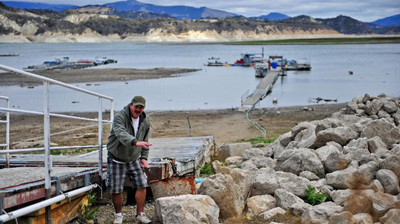加州旱情
Painting the lawn green
把草坪噴綠
Californians find novel ways to cope with drought
加利福尼亞州居民奇思妙想治旱災(zāi)
JACK MELLIGAN, a prison guard in Sacramento, was tired of staring at his brown, patchy lawn—a side-effect of the drought that has parched California for the past three years. He thought about replacing it with shop-bought turf, but worried that he might incur hefty fines for watering it, under new statewide water restrictions. So he paid someone $180 to spray-paint his lawn a cheery green instead.
薩克拉門托(美國(guó)加州首府)獄警杰克·梅麗甘盯著自己家干枯斑駁的草坪,厭倦了——這是在過去三年里,干旱炙烤著加州所帶來了的一個(gè)不良反應(yīng)。杰克正在考慮用商店買來的草皮代替,但遍布加州的限水令卻讓他擔(dān)心,若給草坪澆水,則面臨巨額罰款。所以他花了180美元,雇人給自己家的草坪噴漆,噴上一片讓人心情愉快的綠色。

In a state known for special effects, such fakery is to be expected. If Hollywood can make a green screen look like a terrifying desert on an alien planet, it is only natural that Californians should seek ways to make the terrifying deserts in their front yards look verdant. Mr Melligan is not alone; your correspondent has a wardrobe full of green-stained shoes to prove it.
因加州以特效而聞名,所以像這樣的造假草坪是在意料之中的事。假如好萊塢能制造一個(gè)綠色屏幕,看起來像外星球的可怕荒漠,那么加州的居民想方設(shè)法讓門前荒地變得綠油油,就再自然不過的事情了。
The fad for trompe l'oeil gardening has been a boon for lawn-painters such as David Bartlett, the owner of Xtreme Green Grass, whose business has grown 75% this year. Over the same period Jim Power, who runs a lawn-paint supply company called LawnLift, has seen sales triple. “It has become more socially acceptable to paint your lawn,” he says, “especially as it's become more socially shameful to water it.” At the same time, fewer Californians are buying new turf, says Jurgen Gramckow, who grows the stuff and says sales at his farm in Oxnard are down 20% this year.
仿真園藝熱潮給草坪畫家大衛(wèi)·巴特利特帶來了商機(jī),他是Xtreme Green Grass的老板,今年工作量增加了75%。同期,吉姆·鮑爾名下的草坪噴漆供應(yīng)公司LawnLift銷售量翻了兩翻。“給你的草坪噴漆已經(jīng)被大家接受,”吉姆說道,“特別是在這個(gè)時(shí)候,給你的草坪澆水,是很可恥的一件事。”與此同時(shí),種植草皮的Jurgen Gramckow表示,越來越少的加州居民購(gòu)買草皮,而且他在奧克斯納的公司今年銷售量下降20%。
The drought, one of the worst in a century, has pushed the state to waste a bit less water. In July California banned such things as allowing sprinkler water to run off lawns on to streets and washing cars with hoses that have no shut-off nozzle. And on August 29th the state legislature passed three bills that would allow local agencies, for the first time, to curb excessive pumping of groundwater by landowners.
百年一遇的旱災(zāi)已經(jīng)讓加州節(jié)約用水了。今年七月,加州禁止諸如向草坪澆水和沒有自動(dòng)閉合噴嘴的水管洗車等之類的行為。8月29日,州議會(huì)通過了三項(xiàng)法案,首次允許當(dāng)?shù)貦C(jī)構(gòu)控制土地所有者過分的使用地下水。
Historically, California has resisted groundwater regulation, favouring local property rights even as every other western state embraced state control. But sentiment has shifted with the realisation that the water might run out. By some measures, the state's $45 billion agricultural industry already accounts for 62% of water consumption. And it is getting thirstier, as profitable fruit trees and vines have replaced other crops. As surface reservoirs are depleted, farmers are forced to drill deeper. Perhaps 65% of California's water could come from underground this year, up from 40% in average years, according to the California Water Foundation, a green group. Over-use of wells means that salt water can invade coastal aquifers, and also that fresh water disappears. A recent study by the California Department of Water Resources found that, in about half of the wells surveyed, water levels had already fallen to their lowest point for a century.
有史以來,加州不管制地下水,偏愛當(dāng)?shù)禺a(chǎn)權(quán)問題,然而在西部的其他州,地下水受到州政府監(jiān)管。但是隨著旱情加重,水資源短缺,加州開始發(fā)愁了。加州產(chǎn)值450億美元的農(nóng)業(yè)已經(jīng)消耗62%的水。因高利潤(rùn)的果樹和葡萄藤已經(jīng)取代了其他莊稼,天氣越來越干旱了。隨著地表水庫(kù)消耗殆盡,農(nóng)民不得不往地下更深處汲水。據(jù)加州一個(gè)綠色環(huán)保組織California Water Foundation指出,今年,大概有65%的水來源于地下,地下水用量平均增加了40%。過分使用地下水,意味著海水將流入濱海蓄水層,而且淡水也從此消失。加州水利部門最近的一項(xiàng)研究發(fā)現(xiàn),所有考察過的井中,大約有一半井水的水位線降至歷史最低。
Several cities are trying to conserve water. Earlier this year Santa Cruz began enforcing rationing for every home and a ban on filling hot tubs and jacuzzis, with weighty fines and “Water School” for transgressors. The results are striking: in July citywide water use fell 26% compared with last year. In comparison, statewide water use had declined by only 7.5% from the previous year, despite recent pleas from Governor Jerry Brown to all Californians to cut water use by 20%.
有些城市試圖蓄水。今年年初,圣魯克茲開始實(shí)行家庭定量配給水資源,并禁止任何形式的浴缸用水,違背者接受巨額罰款,并送至“Water School”進(jìn)行教育。效果很顯著:今年七月,較去年全城用水量減少26%,但全州用水量降低只有7.5%,雖然地方長(zhǎng)官杰瑞·布朗最近號(hào)召加州居民減少用水量20%。
The state's water shortages can be resolved only by putting a sensible price on water. State law will eventually require water metering on all buildings, but not until 2025. “We are finally moving toward a pricing system,” says Barton Thompson, a professor of natural resources at Stanford Law School, “which is really the only way to truly encourage people to conserve.”
要解決加州水資源短缺問題,只能通過設(shè)定一個(gè)合理的水價(jià)位。加州的法律最終要求所有的建筑物上按照儀表測(cè)量用水,但不是到2025年。“我們最后制定一個(gè)定價(jià)系統(tǒng),” 斯坦福大學(xué)法學(xué)院自然資源教授巴頓·湯普森說道,“而這確實(shí)是鼓勵(lì)人們節(jié)約用水的唯一辦法。”












